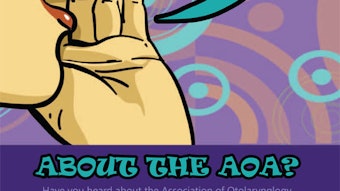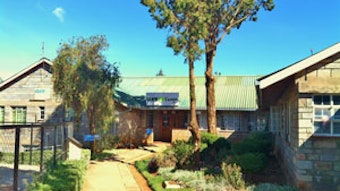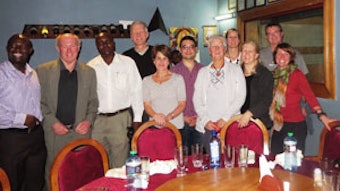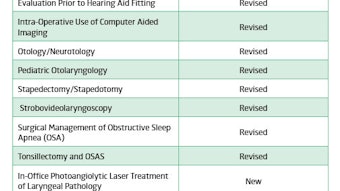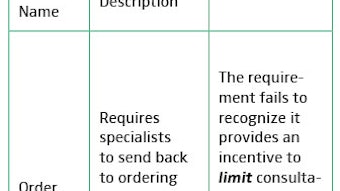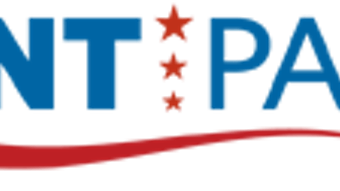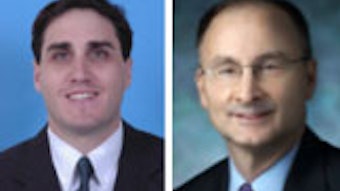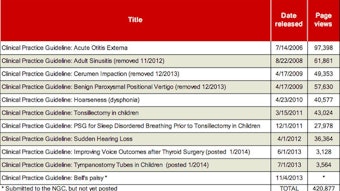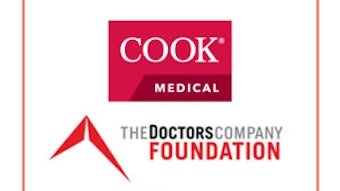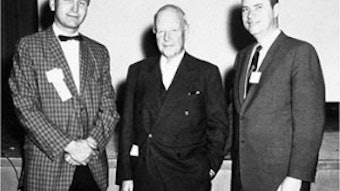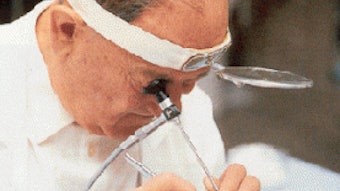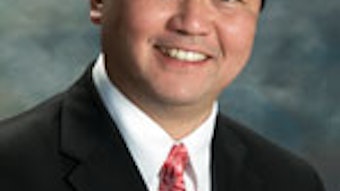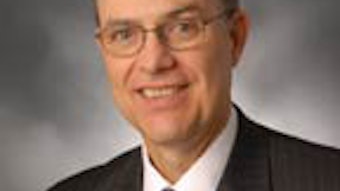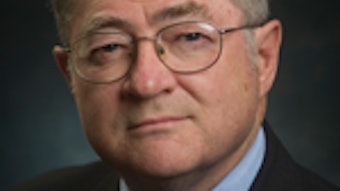Out of Committee: Harry Barnes Society Grantee Reports – ONLINE EXCLUSIVE
My Vancouver Experience Warren Mullings, MB, BS Otolaryngology Senior Resident University of the West Indies, Mona Kingston, Jamaica, WI The AAO-HNSF 2013 Annual Meeting & OTO EXPOSM took place in Vancouver, British Columbia, Canada from September 29 to October 2. The meeting featured lectures and seminars delivered by otolaryngology residents and consultants from across the world. Through the Harry Barnes scholarship, I was afforded the opportunity to attend the conference and the associated meetings. My training in otolaryngology is based at the University of the West Indies (UWI), Mona, Jamaica. The training program is more than 30 years old and graduates one resident each year. Our residents have gone on to practice in the United States, Canada, and the United Kingdom. This year I was granted the incredible opportunity to pursue my elective post- graduate training at the division of Otolaryngology, University of British Columbia (UBC), Vancouver. Under the guidance of highly motivated and skilled surgeons at UBC, I have been able to build on and solidify surgical principles and techniques garnered from my training at the University of the West Indies. This combined training exposure provided a unique perspective on the conference. Being from the University of the West Indies and training at University of British Columbia has exposed me to the thinking and techniques from Europe and North America. It prepares me to achieve good outcomes whether I have all the latest equipment available or if I only have the essential tools to get the job done. With that perspective, I have been able to learn from each presentation how to individualize care based on the patient, the disease, and the treatment facility. The courses I attended provided evidence-based approaches to the disease processes with candid evaluations of the treatment outcomes. My area of interest is endoscopic sinus surgery. The conference provided vast exposure on varying aspects of endoscopic sinus surgery, from the anatomy to advanced surgical techniques for skull base lesions. Attending the Academy’s sinus course, hosted this year by Amin Javer, MD, had the greatest impact. It involved two days of learning from world-renowned experts on how to systematically approach and achieve successful outcomes with endoscopic sinus surgery. Special focus on the approach to the frontal sinus by Professor Heinz Stammberger lead to my improved understanding of the complex anatomy. His demonstration of the dissection was a watershed moment. The course was well organized, engaging, and well received. It truly felt like a once-in-a-lifetime experience to have Drs. Stammberger, Kennedy, Vaughn, and Javer share their expertise and techniques together in an intimate setting. The Academy meeting has been a crucial avenue for me to meet faculty from different programs in North America, Australia, and the United Kingdom. It was a previous Academy meeting in Washington, DC, where I met Desmond Nunez, MD, head of the otolaryngology division, University of British Columbia. I now have the privilege of working with those at UBC, who have embraced me and are eager to share their knowledge and expertise. The Harry Barnes scholarship is an important avenue to maintain and improve cultural diversity within the Academy. As our population becomes more diverse, it is critical for otolaryngology to maintain cultural competency recognizing and addressing the health disparities not only in North America, but also across the globe. Working in two different jurisdictions during my training has enabled me to recognize how differently we view the world based on our background. It affects communication between the surgeon and patient, subsequent compliance with treatment regimes and outcome expectations. The Diversity Committee of the Academy is addressing these challenges, as evidenced by the discussions during the meeting in Vancouver. The city of Vancouver is beautiful with a rich cultural diversity and great food. While temperatures are lower than Jamaica the city’s breathtaking landscape serves as a suitable substitute for the lack of regular sunshine. The nightlife provided a fun and relaxed atmosphere to unwind after the day’s academic sessions. I had a great time at this year’s conference. I am grateful for having been chosen for the award and I am looking forward to this year’s meeting in Orlando. Vancouver—An Inspiring Experience Adedoyin Kalejaiye, MD I am grateful to the American Academy of Otolaryngology–Head and Neck Surgery Foundation and the Barnes Society for giving me the opportunity to attend the 2013 Annual Meeting & OTO EXPOSM in Vancouver, British Columbia. As a young physician in training, it was inspiring to be a part of the global otolaryngology community. It was truly a rewarding experience! The entire meeting was memorable, but the major highlights that especially influenced me were the Diversity Committee meeting, the Opening Ceremony, and the Women in Otolaryngology Luncheon and General Assembly. My experience began with attending the Diversity Committee meeting. The meeting was open, collegial, and thought provoking. As a guest, I was allowed to participate in the discussion and share my ideas. During the session, I learned about the Academy’s goals to encourage and support diversity in its membership. The culture of inclusion is focused not only on membership, but also on leadership. We discussed at length the current goals of the Diversity Committee, which include encouraging underrepresented minorities to participate in leadership roles within the Academy, increasing exposure of our specialty to medical students, and also providing avenues for cultural competency training for physician members. Many of these goals will be achieved through the Diversity Endowment, created in 2010, which will support diversity and cultural competency education, research, and rotations for medical students. At the opening ceremony, I was extremely moved by remarks by James Netterville, MD. He welcomed us to the meeting, likening this gathering of physicians to a reunion, bringing together family members who are connected, unified, and have common goals. While being a part of this family, each physician has his or her own personal journey. Nancy Snyderman, MD, underscored this when she encouraged attendees to pursue their passions even though they may deviate from the norms in career advancement. Her career in broadcast journalism shows that although we practice in the same field, there are still opportunities to express our various talents in unique ways. She also spoke about the practice of medicine, engaging and actually touching patients in order to better connect with them and ultimately provide the best care. Another highlight of the meeting was the Women in Otolaryngology Luncheon and General Assembly that was well attended. The keynote address was given by Dr. Surawicz from the University of Washington. She encouraged residents and young physicians not to shy away from leadership positions. During her talk, a few minutes were provided for us to share our training and career experiences with those around us. This informal discussion allowed us to share common challenges many of us have faced and it was wonderful to have words of encouragement from more experienced colleagues. She stressed the importance of having mentors and also being a mentor throughout one’s professional career. Mentors play a key role in identifying potential and helping develop talent; as we move forward in our careers, it is our responsibility to help others blossom as well. The first poster presentation breakfast at the annual meeting took place this year. Despite the early hour, many presenters attended the event. I had the opportunity to discuss my poster and research with fellow physicians and I enjoyed interacting with otolaryngologists from international institutions. This made the Academy feel truly like a global community. In addition, the Miniseminars and instruction courses offered were extremely beneficial. Many were resident-oriented and there were numerous opportunities to learn about new advances in otolaryngology. Most importantly, the sessions appealed to all of the subspecialties and areas of interest in our field. Overall, the Annual Meeting and OTO EXPO was both educational and inspirational and I am looking forward to this year’s meeting in Orlando.
My Vancouver Experience
Warren Mullings, MB, BS
Otolaryngology Senior Resident
University of the West Indies, Mona
Kingston, Jamaica, WI
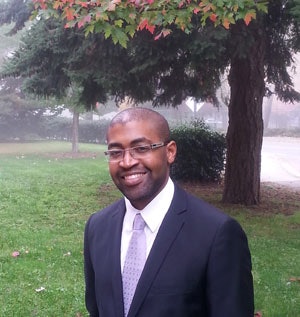
My training in otolaryngology is based at the University of the West Indies (UWI), Mona, Jamaica. The training program is more than 30 years old and graduates one resident each year. Our residents have gone on to practice in the United States, Canada, and the United Kingdom.
This year I was granted the incredible opportunity to pursue my elective post- graduate training at the division of Otolaryngology, University of British Columbia (UBC), Vancouver. Under the guidance of highly motivated and skilled surgeons at UBC, I have been able to build on and solidify surgical principles and techniques garnered from my training at the University of the West Indies. This combined training exposure provided a unique perspective on the conference.
Being from the University of the West Indies and training at University of British Columbia has exposed me to the thinking and techniques from Europe and North America. It prepares me to achieve good outcomes whether I have all the latest equipment available or if I only have the essential tools to get the job done. With that perspective, I have been able to learn from each presentation how to individualize care based on the patient, the disease, and the treatment facility. The courses I attended provided evidence-based approaches to the disease processes with candid evaluations of the treatment outcomes.
My area of interest is endoscopic sinus surgery. The conference provided vast exposure on varying aspects of endoscopic sinus surgery, from the anatomy to advanced surgical techniques for skull base lesions. Attending the Academy’s sinus course, hosted this year by Amin Javer, MD, had the greatest impact. It involved two days of learning from world-renowned experts on how to systematically approach and achieve successful outcomes with endoscopic sinus surgery. Special focus on the approach to the frontal sinus by Professor Heinz Stammberger lead to my improved understanding of the complex anatomy. His demonstration of the dissection was a watershed moment. The course was well organized, engaging, and well received. It truly felt like a once-in-a-lifetime experience to have Drs. Stammberger, Kennedy, Vaughn, and Javer share their expertise and techniques together in an intimate setting.
The Academy meeting has been a crucial avenue for me to meet faculty from different programs in North America, Australia, and the United Kingdom. It was a previous Academy meeting in Washington, DC, where I met Desmond Nunez, MD, head of the otolaryngology division, University of British Columbia. I now have the privilege of working with those at UBC, who have embraced me and are eager to share their knowledge and expertise.
The Harry Barnes scholarship is an important avenue to maintain and improve cultural diversity within the Academy. As our population becomes more diverse, it is critical for otolaryngology to maintain cultural competency recognizing and addressing the health disparities not only in North America, but also across the globe. Working in two different jurisdictions during my training has enabled me to recognize how differently we view the world based on our background. It affects communication between the surgeon and patient, subsequent compliance with treatment regimes and outcome expectations. The Diversity Committee of the Academy is addressing these challenges, as evidenced by the discussions during the meeting in Vancouver.
The city of Vancouver is beautiful with a rich cultural diversity and great food. While temperatures are lower than Jamaica the city’s breathtaking landscape serves as a suitable substitute for the lack of regular sunshine.
The nightlife provided a fun and relaxed atmosphere to unwind after the day’s academic sessions. I had a great time at this year’s conference. I am grateful for having been chosen for the award and I am looking forward to this year’s meeting in Orlando.
Vancouver—An Inspiring Experience
Adedoyin Kalejaiye, MD
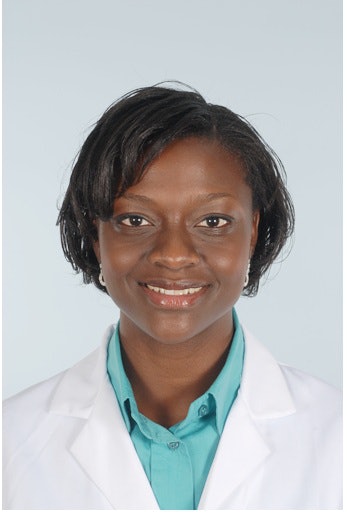
My experience began with attending the Diversity Committee meeting. The meeting was open, collegial, and thought provoking. As a guest, I was allowed to participate in the discussion and share my ideas. During the session, I learned about the Academy’s goals to encourage and support diversity in its membership. The culture of inclusion is focused not only on membership, but also on leadership. We discussed at length the current goals of the Diversity Committee, which include encouraging underrepresented minorities to participate in leadership roles within the Academy, increasing exposure of our specialty to medical students, and also providing avenues for cultural competency training for physician members. Many of these goals will be achieved through the Diversity Endowment, created in 2010, which will support diversity and cultural competency education, research, and rotations for medical students.
At the opening ceremony, I was extremely moved by remarks by James Netterville, MD. He welcomed us to the meeting, likening this gathering of physicians to a reunion, bringing together family members who are connected, unified, and have common goals. While being a part of this family, each physician has his or her own personal journey. Nancy Snyderman, MD, underscored this when she encouraged attendees to pursue their passions even though they may deviate from the norms in career advancement. Her career in broadcast journalism shows that although we practice in the same field, there are still opportunities to express our various talents in unique ways. She also spoke about the practice of medicine, engaging and actually touching patients in order to better connect with them and ultimately provide the best care.
Another highlight of the meeting was the Women in Otolaryngology Luncheon and General Assembly that was well attended. The keynote address was given by Dr. Surawicz from the University of Washington. She encouraged residents and young physicians not to shy away from leadership positions. During her talk, a few minutes were provided for us to share our training and career experiences with those around us. This informal discussion allowed us to share common challenges many of us have faced and it was wonderful to have words of encouragement from more experienced colleagues. She stressed the importance of having mentors and also being a mentor throughout one’s professional career. Mentors play a key role in identifying potential and helping develop talent; as we move forward in our careers, it is our responsibility to help others blossom as well.
The first poster presentation breakfast at the annual meeting took place this year. Despite the early hour, many presenters attended the event. I had the opportunity to discuss my poster and research with fellow physicians and I enjoyed interacting with otolaryngologists from international institutions. This made the Academy feel truly like a global community. In addition, the Miniseminars and instruction courses offered were extremely beneficial. Many were resident-oriented and there were numerous opportunities to learn about new advances in otolaryngology. Most importantly, the sessions appealed to all of the subspecialties and areas of interest in our field.
Overall, the Annual Meeting and OTO EXPO was both educational and inspirational and I am looking forward to this year’s meeting in Orlando.
